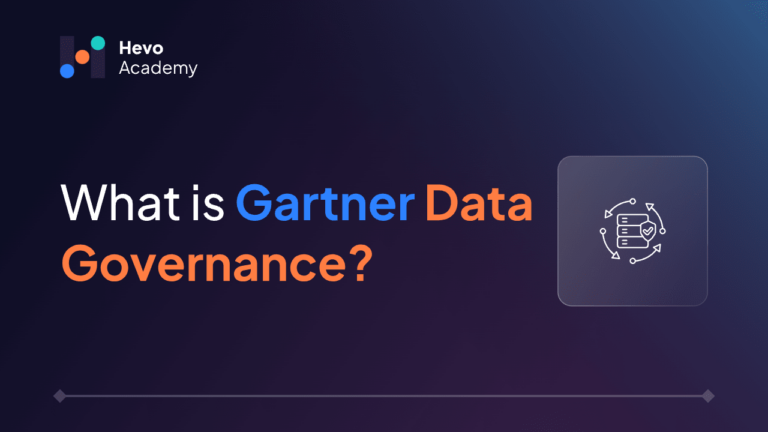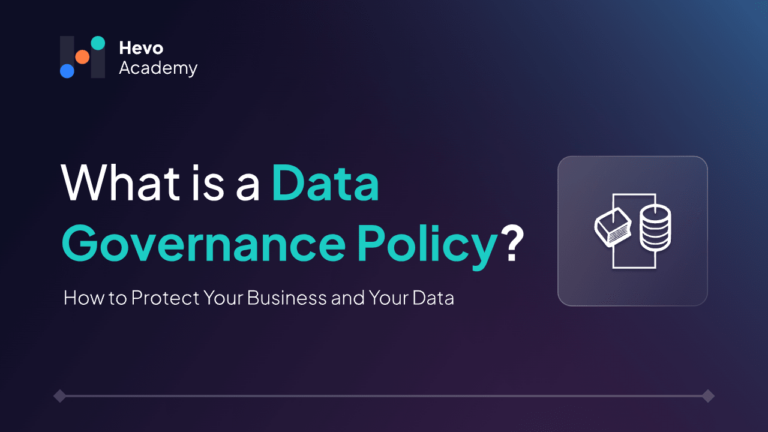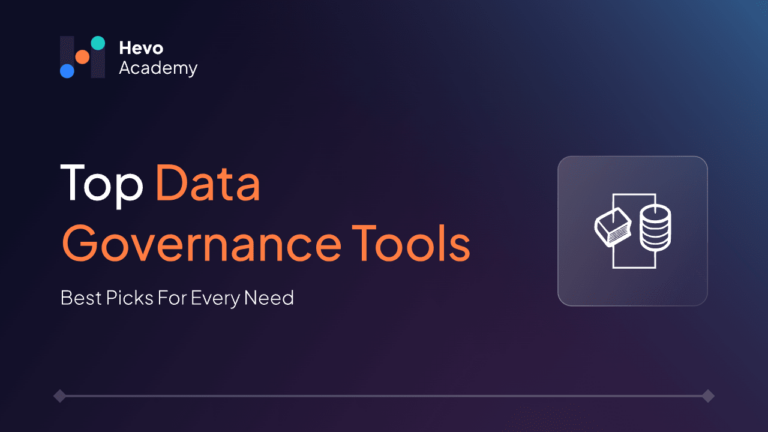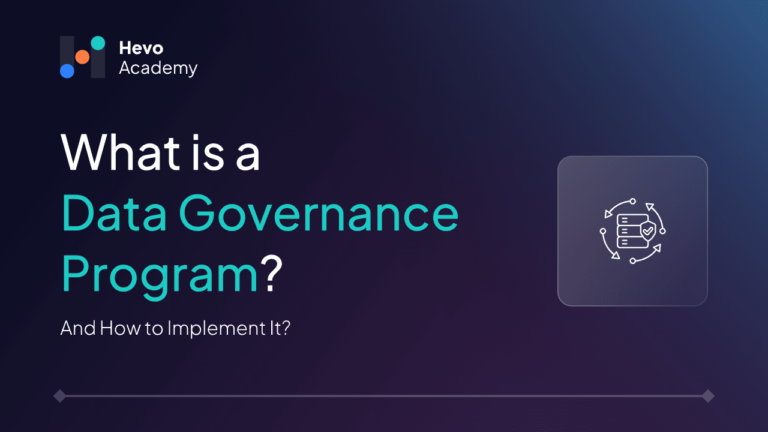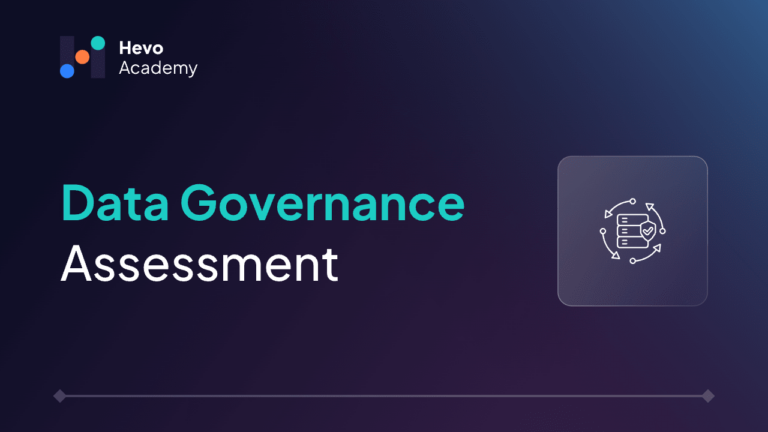Data has become a significant asset for many organizations and businesses in this digital economy. However, the effective management of data still poses significant challenges. This is where data governance can come in. As one of the essential elements of data management, data governance ensures that the data used within an organization is available, usable, trustworthy, secure, and adequately valued. Data governance is essential for proper data management and compliance as regulations evolve. One of the foremost global research and advisory firms, Gartner, provides excellent insights into how organizations can successfully implement data governance.
Table of Contents
This blog examines how Gartner data governance is defined, its benefits, challenges, and how data and analytics governance platforms fit in.
What is Data Governance, as per Gartner?
According to Gartner, Data governance involves establishing rules and accountability around data use and administration within an organization. It ensures that data is used correctly, appraised appropriately, and secured against abuse.
Data governance is the enforcement of control and authority over data management within any organization. Data governance aims to increase data value and minimize data-related costs and risks. This starts with the integrity of the data input based on a well-defined data element and a wide range of activities like data quality, security, privacy, and compliance. In data governance, differentiating between data quality and data integrity helps address specific risks and maintain data’s relevance and reliability.
Gartner argued that data governance should not only involve policies and procedures but also the roles and responsibilities that ensure compliance and accountability. Also, the Data Governance approach must be cross-functional, involving stakeholders across departments to ensure that data governance practices are holistic and comprehensive.
Benefits of implementing Gartner Data Governance as per Gartner’s Framework
Implementing Gartner data governance, can lead to numerous benefits for an organization. Some of these are listed below:
- Improving Data Quality: Ensuring a constant, high data quality with data quality strategies is one of the most essential features facilitated by data governance. Quality data will enable faster decision-making, leading to better operational efficiency.
- Increased Data Protection: Organizations can protect sensitive data from unauthorized access and breaches by implementing strong data governance practices.
- Improved Compliance: Data governance ensures that organisations remain in compliance with industry regulations and compliance requirements such as GDPR, HIPAA and more.
- Data Usage Efficiency: Strong data governance allows organizations to maximize the value of their data assets to make them available and actionable for analytics and other uses.
- Enhanced Decision Making: By providing a clear understanding of data lineage, quality, and governance, data governance supports informed and data-driven decision-making.
- Better decision-making: If you know the lineage, quality, and governance of your data, you can make better, more data-informed decisions.
What Challenges are Associated with Data Governance, according to Gartner?
Data governance challenges occur in almost every organization. Data has the potential to be the most significant competitive advantage, so it makes sense for organizations to invest in tools and technologies and other ways of extracting meaningful insights from an organization’s data. But suppose organizations don’t have a good data governance framework and haven’t emphasized that governance is everybody’s business. In that case, the various challenges that come with data governance can limit that competitive advantage.
To use data as a source of intellect and strategic advantage, organizational data must be easy to understand and used. But at the same time, Organizations must provide checks and control in place so that people use data in ways that don’t put the organization at risk.
According to Gartner, these are some of the challenges organizations must overcome
- Resistance from organizations: Gartner argued that organizations may face resistance when attempting to implement data governance from different departments or individuals unwilling to relinquish control over their data.
- Data Silos: Many organizations struggle to overcome data silos, in which different departments or business units store data in separate and disconnected data sets. A lack of corporate data standards can make it challenging to manage these data silos.
- Limited Resources: Some organizations consider data managements as a luxury, as a comprehensive data governance program requires a lot of investment in time, technology and resources.
- Evolving Data Landscape: With an increasing number of new data sources and technologies coming to market, it’s hard to know which data governance best practices will be relevant.
How do Data and Analytics Governance Platforms fit into Gartner’s view of Data Governance?
Gartner notes that data and analytics governance platforms are increasingly central to data governance strategies. These platforms support data governance activities involving data discovery, data cataloging, data lineage tracking, data compliance monitoring, various data certification and attestation activities, and more. Integrating data and analytics governance platforms helps you manage the growing volume of data in ways that enable you to maintain adherence to governance policies.
Key features of these platforms, as highlighted by Gartner, include:
- Data Catalogs: Most data platforms come with data catalogues or administrators to discover, define, and manage their data assets. By providing an understanding of where data originates and how it’s used across the enterprise, this capability is essential to governance.
- Automated Compliance Monitoring: Most governance solutions have built-in automated compliance tools that allow organizations to track their data usage in real-time. This is essential for compliance with information governance and privacy regulations. These tools automate lineage tracking and data-processing audits, which makes it easier for businesses to meet their regulatory obligations.
- Metadata Management: Metadata management is always the beginning, middle, and end of data governance Governing data entails controlling data’s meaning, so the governance platform provides tools for managing and standardizing metadata. All of the definitions and metadata attributes have to be the same.
- Collaboration and Accountability: Collaboration features that allow multiple teams within an organisation to collectively work on data governance efforts can be found in many data governance platforms. With visibility into who is responsible for data stewardship, it becomes easier to hold people accountable.
Conclusion
For organization to get the most from its data assets, that data has to be accessible, manageable, and trusted. It must be used in compliance with regulations and protected against misuse. Gartner data governance concluded that a robust data governance framework provides a valuable roadmap for organizations and businesses attempting to establish control over their data assets. A well-implemented data governance framework addresses these data governance challenges, and the toolset assures the organization of the confidence to make data widely accessible yet secure.
Sign up for a 14-day free trial and experience the feature-rich Hevo suite first hand. Check out the Hevo pricing details.
Frequently Asked Questions
1. What are the three key elements of good data governance?
Data governance includes a set of processes, policies, and standards that ensure an organization’s effective management and use of data. Key elements include: Data Strategy, Data Ownership and Data Stewardship.
2. What is data governance in a nutshell?
Data governance is the management framework for organisations to control their data assets by allowing organisations to securely, accurately and with complete compliance create, manage and utilise data for improved decision-making. It involves policies and procedures governing data management, accountability, and aggressive measures to manage the data.
3. What is the modern data governance strategy?
A modern data governance strategy is adaptable, easy to scale, integrated with data and analytics platforms, and attempts to harness automation and AI to manage data quality, compliance, and data process improvements. Contemporary data governance strategies are more collaborative and seek to blend stakeholders across the organization to promote data literacy and accountability.

